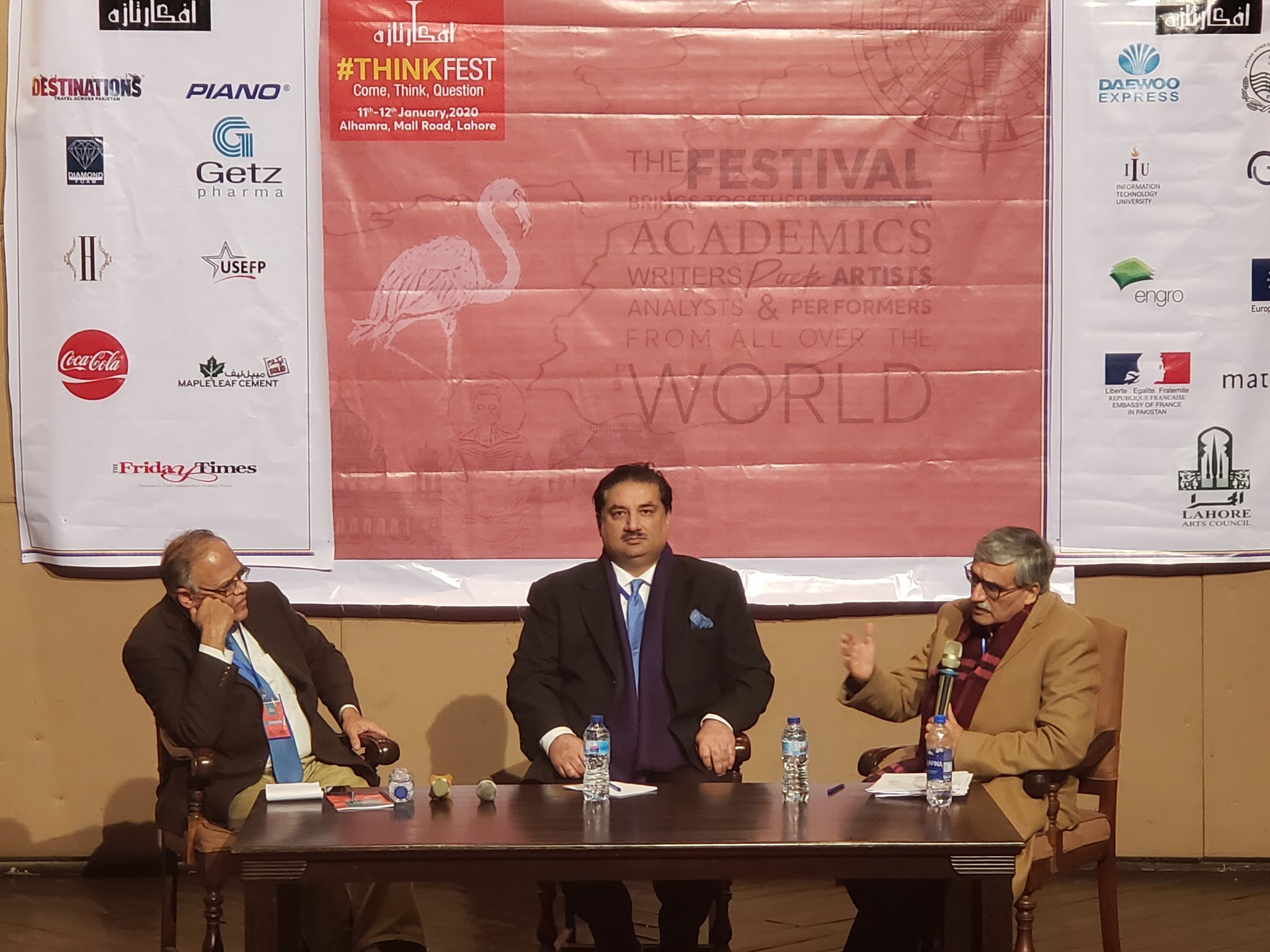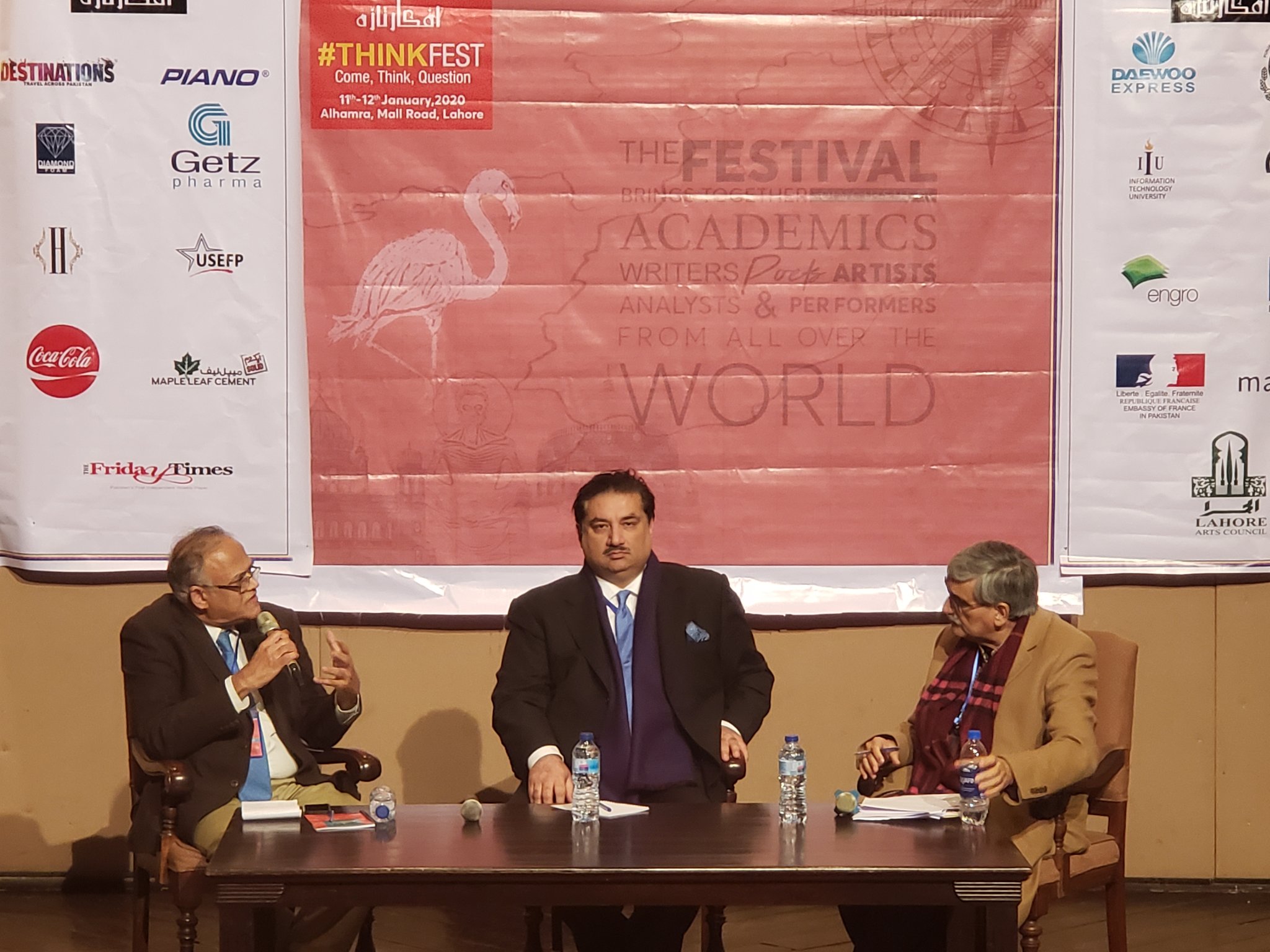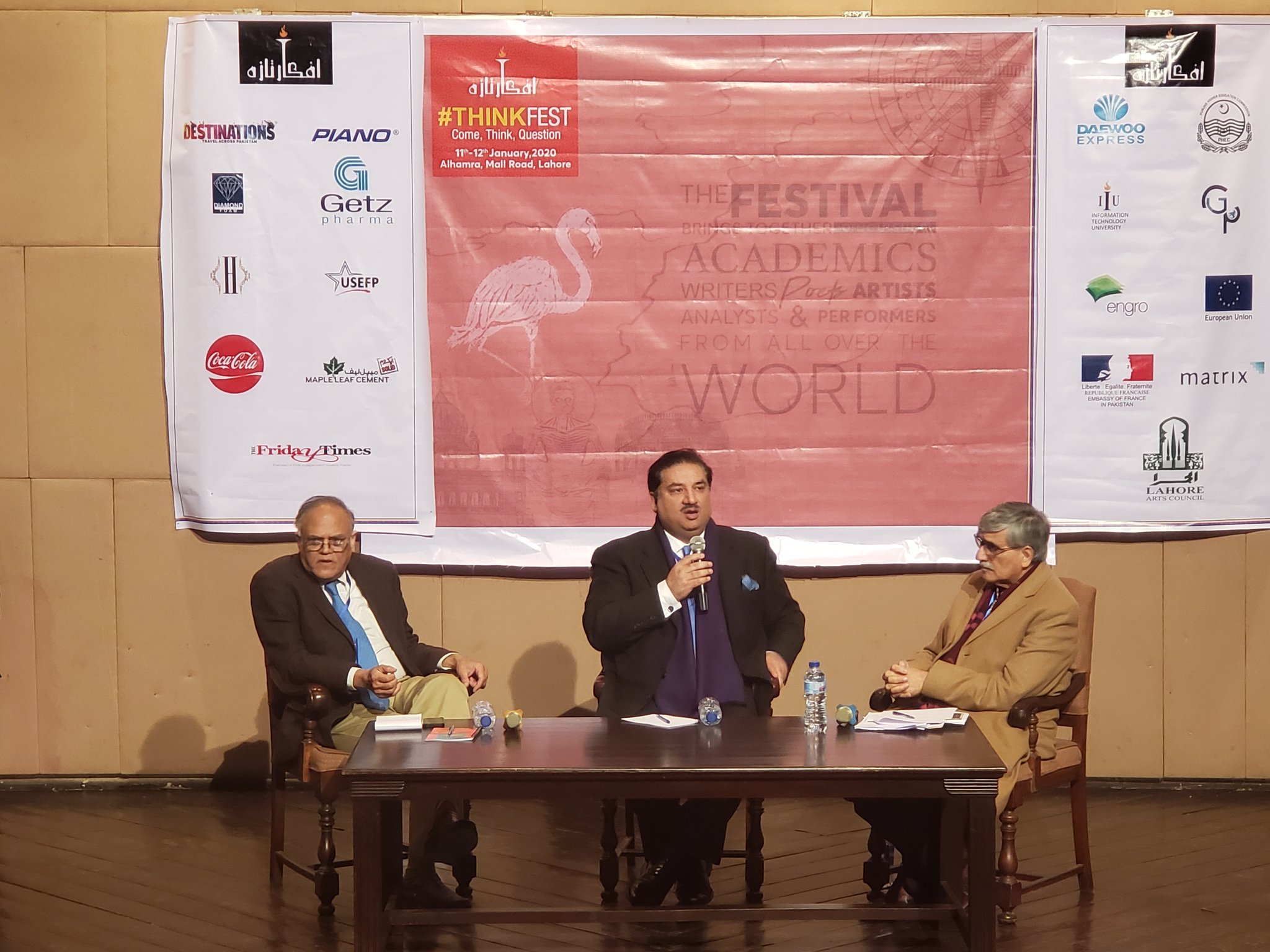Opening the discussion, Mr. Ahmed Bilal Mehboob asked Mr. Javed Jabbar, former Senator, former Federal Minister, what he felt about the evolution of Parliament in Pakistan.
Mr. Javed Jabbar said that even though we have had four military interventions in the past and still have an authoritarian dimension to our society, we are a democratic people. He said this is manifested not only in the parliament where things have been sporadic, but bar associations, teachers associations, medical associations, and private clubs, where Pakistanis are busy contesting elections year-round. We have had 15 Parliaments in the past 72 years and inherited a pre-1947 Constituent Assembly. Throughout these 72 years, Parliament has evolved from parity to equity, indirectly elected to directly elected, from non-party parliament to a full-blooded party-based Parliament. The composition of Parliament has also moved from a predominantly elite, feudal class to having a component of the working or middle-class Pakistanis. The fundamental change happened in 2002 with the introduction of 17% reserved seats for women. This has changed the whole ethos of Parliament. Whereas Parliament is still subject to overt and covert pressures from the military, nevertheless, it has evolved and represents a very positive facet of the Pakistani society.

In response to a question about the lack of discussion on important legislations in the Parliament, Mr. Khurram Dastgir Khan, MNA, former Federal Minister, said that even the 18th amendment is criticized for not being discussed in the Parliament enough; however, before the amendment was introduced in the house, Parliamentarians spent a good 2 years deliberating on the 18th amendment in the committee rooms. Talking about the recent Army Act passed by the Parliament, he said that consultation on the bill started one week before it was tabled in the house. A meeting between government representatives and opposition parties was called where they reviewed the bill. But since these deliberations are not part of the final process, they are not in the public eye. The current bill was discussed by opposition parties and amendments were proposed even the night before it came to the floor.

Answering a question on the role of the Parliament, Mr. Dastgir added that, for him, the value of Parliament is that it represents all of Pakistan. In the house, he is representing Gujranwala; someone is representing Ghotki, someone is representing Mardan, which means it is a forum where the viewpoints of representatives from across the country are put forth. Just the presence of these representatives in the house is valuable and essential for the country’s solidarity. He said, despite its weaknesses, Parliament is the last castle that stands against terrorism.
Moving forward, Mr. Ahmed Bilal Mehboob, asked Mr. Javed Jabbar his thoughts on the provision for ‘Legislation by decree’, which provided room for the current government to pass 14 Ordinances bypassing the Parliament as compared to 7 bills passed by the House in the same period. Mr. Jabbar maintained that it is essential to have a provision for emergencies, however, the way it has been consistently overused is condemnable and should be discouraged. Nevertheless, the perennial problem of quorum plays a role significant role in paving the way for overuse of ordinances. Amongst the three pillars of the State, the Legislature, the Judiciary and the Executive, the Legislature surely has supremacy, and it should serve that responsibility by acting as a role model for the other branches of the state. There are many issues with our Judiciary, but none of the quorum, similarly public servants may turn up late but they do attend their office. The Legislature, on the other hand, has no compulsion of attending the House proceedings. Instead, legislators choose when they want to show up. Mr. Jabbar said in his opinion, Parliamentarians should be bound to participate in 90% of the sittings, and a fine should be imposed for missing more than 10% of sessions.
Giving his views on the issue at hand, Mr. Khurram Dastgir Khan said ordinances should be discontinued save emergencies, when the Prime Minister officially declares a National Emergency. Parliament should always be in session from Monday to Thursday. If the Executive knows it is continuously in session, ordinances would be tough to justify. “I remember when I first got elected, by God’s grace, a decade ago, Ahmed Bilal Sahib gave us our first lecture on the roles of an MNA; Legislation, Representation and Oversight of the Executive. I still remember the lesson after 11 years” he said. Out of the three functions of the legislators, our legislators focus more on the representation function. This tendency is due to the fact that voters expect their MNA/MPA to solve the issues of their constituency.

Political leaders in the country also do not have confidence in Parliament as an institution of the State even though the Parliament has supported the government on various occasions. For instance, in 2015, when there was pressure on the government to send forces to Yemen, Parliament resisted and provided much-needed cushion to Pakistan’s foreign policy. Similarly, in 1998, in the case of the Comprehensive Test Ban Treaty, Parliament refused to let the government be a part of it. We have to strengthen Parliament ourselves, since no one else is going to do it for us.
Mr. Javed Jabbar, on the question of direct elections of Senators, expressed his belief in the direct elections of Senators, though with three necessary conditions. The first condition is to ensure people could be elected based on merit, not their resources. Similarly, there should be a provision to ensure that men do not dominate the Senate. The third condition is to find a way to avoid partisanship, which gives room to deadlocks ultimately paralyzing decision-making. He added that we need a pronounced discussion on this subject to establish a consensus.
Sharing his views on why All Parties Conferences are used to discussing pressing issues as opposed to the Parliament where elected members of these parties are present also, Mr. Khurram Dastgir Khan said APCc are held mainly for including parties which are outside the Parliament. There needs to be a significant cultural systematic change which ensures party heads give Parliament the centrality that it deserves. Despite everything else, conversation amongst parties outside the house improves legislation. There are some parliamentary norms used to encourage a better working relationship between the government and the opposition, one of which is having Chairs of some committees from the Opposition and giving them more representation on others. Concluding his remarks, he said if words like ‘Kaafir (Infidel), Ghaddar (Traitor) and Chor (Thief) are eliminated from Parliamentary discourse, our democracy would go a long way.
Mr. Javed Jabbar said that APCs are used so that political leaders can avoid parliamentary norms and discuss topics which they cannot speak about in the house.
In response to a question from the audience, Mr. Dastgir said, “If there was any pressure to vote for the Army Act, it was on our leadership, not on the parliamentarians like me”. Speaking on the role the military in Pakistani Politics, Mr. Dastgir sai, “DekhieN hamieN khul kar baat karni chaahiye. Mai Javed Jabbar Sahib ka bhi shukar guzaar hoon jinhon ne shuru mai hi straightforward lafz istimaal kiya – military. We have to see it squarely in the face. Iss lehaz se nahi ke hum ne isko mughasbat ki nazar se dekhna hai, hum ne iss nazar se dekhna hai ke woh Pakistan ki siyasat ka hissa hai. We have to accept it. Hissa hony ka aik matlab yeh bhi hai ke woh Pakistan ke awaam ki khushnoodi aur unki himayat ke utny hi daawedaar aur umeedwaar hain jitni siyaasi partiyaan”. He added that in 2008 when opposition parties decided to impeach Musharraf, he resigned as a result without any violence, on August 18, 2008. In the coming years, the media, the judiciary and other fragments of the state and society started getting their due constitutional freedoms. He believed, after ten years, in 2018, things have come full circle, and we are under pressure again because we have refused to tackle the issue head-on.
Replying to another question from the audience, Mr. Dastgir said we have so many reservations on General Election 2018 results but even then we came to the Parliament to represent our people because it is important for the people to comprehend the democratic culture and it could only happen through continuity in the electoral process. It is important to know that representatives of the people put the people’s priorities first; and the people are rarely concerned about larger issues of constituency but the trend is slowly changing for better, he added. “Yahaan jahaan jahaan bhi priorities ayengi awaam ki aur woh ijtimaayi taur par apny membraan e assembly ko jab push karna shuru karengy, utna hi aap dekhengy key yeh moamla tabdeel hota jaye ga”, he concluded.






